Analysis of Partnerships and Directors' Legal Obligations
VerifiedAdded on 2021/06/18
|9
|2482
|497
Report
AI Summary
This report delves into two key areas of business law: partnerships and directors' duties. The first section analyzes the formation of a partnership under Australian law, outlining the essential elements such as common intention, carrying on business, and profit sharing, referencing relevant case law. It then applies these principles to a scenario involving Samuel, Thomas, and Peta, concluding that their business venture constitutes a partnership. The second section focuses on the duties of company directors, distinguishing between common law and statutory obligations. It examines the duties of care and diligence, and the duties of loyalty and good faith, referencing the Corporations Act 2001 and key legal precedents. The report details the consequences of violating these duties, including civil and criminal penalties, providing a comprehensive overview of the legal responsibilities of business partners and company directors. This report is designed to provide a clear understanding of the legal aspects of partnerships and directors' duties.
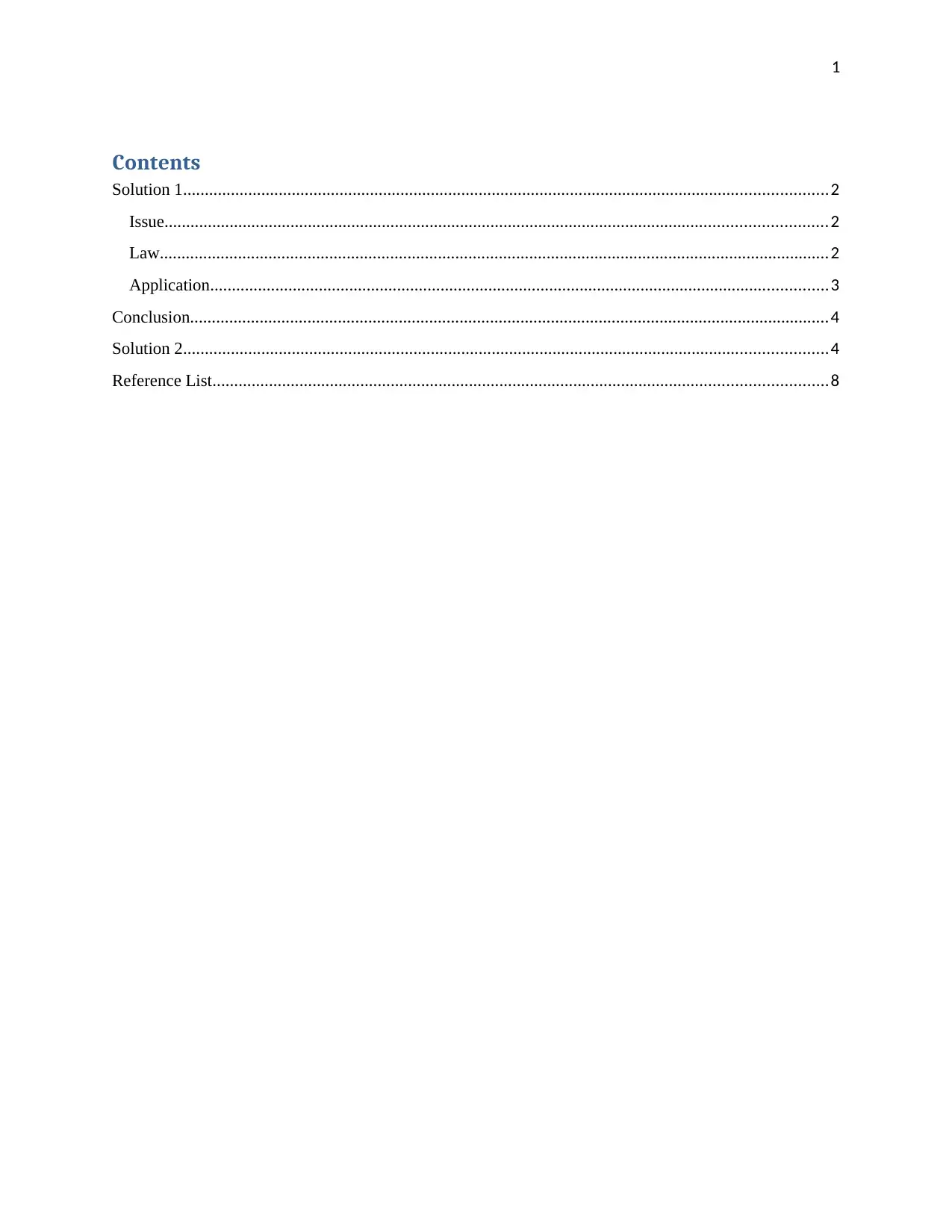
1
Contents
Solution 1....................................................................................................................................................2
Issue........................................................................................................................................................2
Law..........................................................................................................................................................2
Application..............................................................................................................................................3
Conclusion...................................................................................................................................................4
Solution 2....................................................................................................................................................4
Reference List.............................................................................................................................................8
Contents
Solution 1....................................................................................................................................................2
Issue........................................................................................................................................................2
Law..........................................................................................................................................................2
Application..............................................................................................................................................3
Conclusion...................................................................................................................................................4
Solution 2....................................................................................................................................................4
Reference List.............................................................................................................................................8
Paraphrase This Document
Need a fresh take? Get an instant paraphrase of this document with our AI Paraphraser
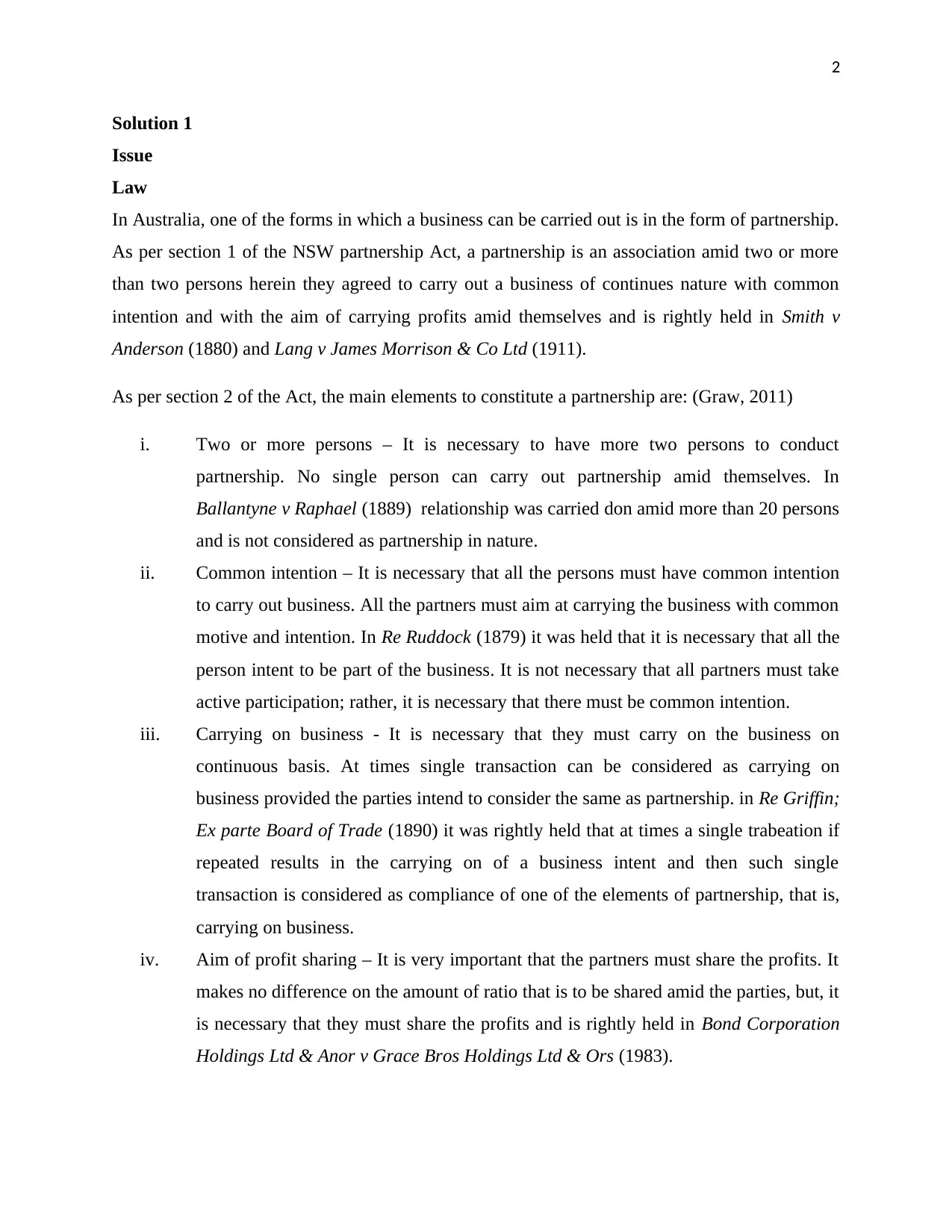
2
Solution 1
Issue
Law
In Australia, one of the forms in which a business can be carried out is in the form of partnership.
As per section 1 of the NSW partnership Act, a partnership is an association amid two or more
than two persons herein they agreed to carry out a business of continues nature with common
intention and with the aim of carrying profits amid themselves and is rightly held in Smith v
Anderson (1880) and Lang v James Morrison & Co Ltd (1911).
As per section 2 of the Act, the main elements to constitute a partnership are: (Graw, 2011)
i. Two or more persons – It is necessary to have more two persons to conduct
partnership. No single person can carry out partnership amid themselves. In
Ballantyne v Raphael (1889) relationship was carried don amid more than 20 persons
and is not considered as partnership in nature.
ii. Common intention – It is necessary that all the persons must have common intention
to carry out business. All the partners must aim at carrying the business with common
motive and intention. In Re Ruddock (1879) it was held that it is necessary that all the
person intent to be part of the business. It is not necessary that all partners must take
active participation; rather, it is necessary that there must be common intention.
iii. Carrying on business - It is necessary that they must carry on the business on
continuous basis. At times single transaction can be considered as carrying on
business provided the parties intend to consider the same as partnership. in Re Griffin;
Ex parte Board of Trade (1890) it was rightly held that at times a single trabeation if
repeated results in the carrying on of a business intent and then such single
transaction is considered as compliance of one of the elements of partnership, that is,
carrying on business.
iv. Aim of profit sharing – It is very important that the partners must share the profits. It
makes no difference on the amount of ratio that is to be shared amid the parties, but, it
is necessary that they must share the profits and is rightly held in Bond Corporation
Holdings Ltd & Anor v Grace Bros Holdings Ltd & Ors (1983).
Solution 1
Issue
Law
In Australia, one of the forms in which a business can be carried out is in the form of partnership.
As per section 1 of the NSW partnership Act, a partnership is an association amid two or more
than two persons herein they agreed to carry out a business of continues nature with common
intention and with the aim of carrying profits amid themselves and is rightly held in Smith v
Anderson (1880) and Lang v James Morrison & Co Ltd (1911).
As per section 2 of the Act, the main elements to constitute a partnership are: (Graw, 2011)
i. Two or more persons – It is necessary to have more two persons to conduct
partnership. No single person can carry out partnership amid themselves. In
Ballantyne v Raphael (1889) relationship was carried don amid more than 20 persons
and is not considered as partnership in nature.
ii. Common intention – It is necessary that all the persons must have common intention
to carry out business. All the partners must aim at carrying the business with common
motive and intention. In Re Ruddock (1879) it was held that it is necessary that all the
person intent to be part of the business. It is not necessary that all partners must take
active participation; rather, it is necessary that there must be common intention.
iii. Carrying on business - It is necessary that they must carry on the business on
continuous basis. At times single transaction can be considered as carrying on
business provided the parties intend to consider the same as partnership. in Re Griffin;
Ex parte Board of Trade (1890) it was rightly held that at times a single trabeation if
repeated results in the carrying on of a business intent and then such single
transaction is considered as compliance of one of the elements of partnership, that is,
carrying on business.
iv. Aim of profit sharing – It is very important that the partners must share the profits. It
makes no difference on the amount of ratio that is to be shared amid the parties, but, it
is necessary that they must share the profits and is rightly held in Bond Corporation
Holdings Ltd & Anor v Grace Bros Holdings Ltd & Ors (1983).
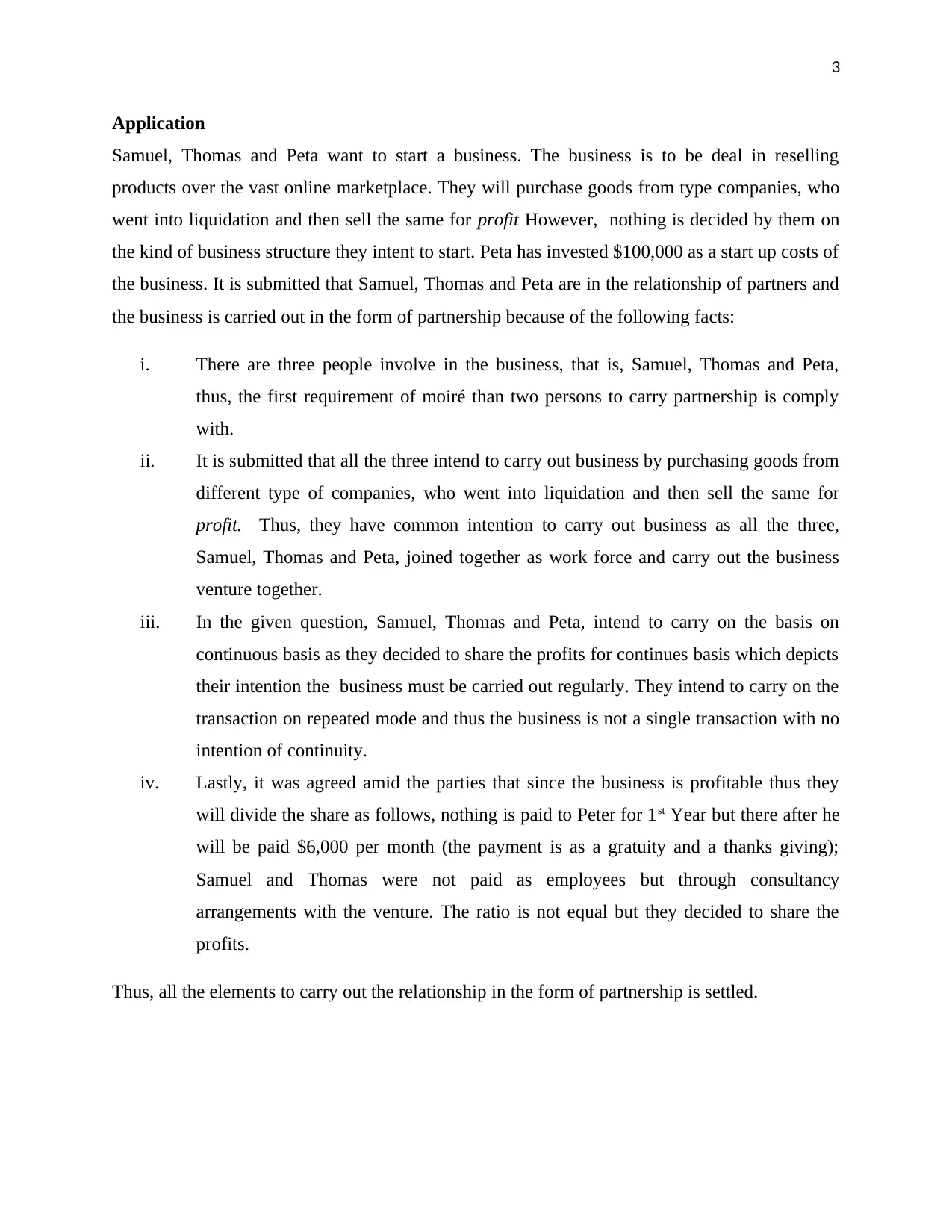
3
Application
Samuel, Thomas and Peta want to start a business. The business is to be deal in reselling
products over the vast online marketplace. They will purchase goods from type companies, who
went into liquidation and then sell the same for profit However, nothing is decided by them on
the kind of business structure they intent to start. Peta has invested $100,000 as a start up costs of
the business. It is submitted that Samuel, Thomas and Peta are in the relationship of partners and
the business is carried out in the form of partnership because of the following facts:
i. There are three people involve in the business, that is, Samuel, Thomas and Peta,
thus, the first requirement of moiré than two persons to carry partnership is comply
with.
ii. It is submitted that all the three intend to carry out business by purchasing goods from
different type of companies, who went into liquidation and then sell the same for
profit. Thus, they have common intention to carry out business as all the three,
Samuel, Thomas and Peta, joined together as work force and carry out the business
venture together.
iii. In the given question, Samuel, Thomas and Peta, intend to carry on the basis on
continuous basis as they decided to share the profits for continues basis which depicts
their intention the business must be carried out regularly. They intend to carry on the
transaction on repeated mode and thus the business is not a single transaction with no
intention of continuity.
iv. Lastly, it was agreed amid the parties that since the business is profitable thus they
will divide the share as follows, nothing is paid to Peter for 1st Year but there after he
will be paid $6,000 per month (the payment is as a gratuity and a thanks giving);
Samuel and Thomas were not paid as employees but through consultancy
arrangements with the venture. The ratio is not equal but they decided to share the
profits.
Thus, all the elements to carry out the relationship in the form of partnership is settled.
Application
Samuel, Thomas and Peta want to start a business. The business is to be deal in reselling
products over the vast online marketplace. They will purchase goods from type companies, who
went into liquidation and then sell the same for profit However, nothing is decided by them on
the kind of business structure they intent to start. Peta has invested $100,000 as a start up costs of
the business. It is submitted that Samuel, Thomas and Peta are in the relationship of partners and
the business is carried out in the form of partnership because of the following facts:
i. There are three people involve in the business, that is, Samuel, Thomas and Peta,
thus, the first requirement of moiré than two persons to carry partnership is comply
with.
ii. It is submitted that all the three intend to carry out business by purchasing goods from
different type of companies, who went into liquidation and then sell the same for
profit. Thus, they have common intention to carry out business as all the three,
Samuel, Thomas and Peta, joined together as work force and carry out the business
venture together.
iii. In the given question, Samuel, Thomas and Peta, intend to carry on the basis on
continuous basis as they decided to share the profits for continues basis which depicts
their intention the business must be carried out regularly. They intend to carry on the
transaction on repeated mode and thus the business is not a single transaction with no
intention of continuity.
iv. Lastly, it was agreed amid the parties that since the business is profitable thus they
will divide the share as follows, nothing is paid to Peter for 1st Year but there after he
will be paid $6,000 per month (the payment is as a gratuity and a thanks giving);
Samuel and Thomas were not paid as employees but through consultancy
arrangements with the venture. The ratio is not equal but they decided to share the
profits.
Thus, all the elements to carry out the relationship in the form of partnership is settled.
⊘ This is a preview!⊘
Do you want full access?
Subscribe today to unlock all pages.

Trusted by 1+ million students worldwide
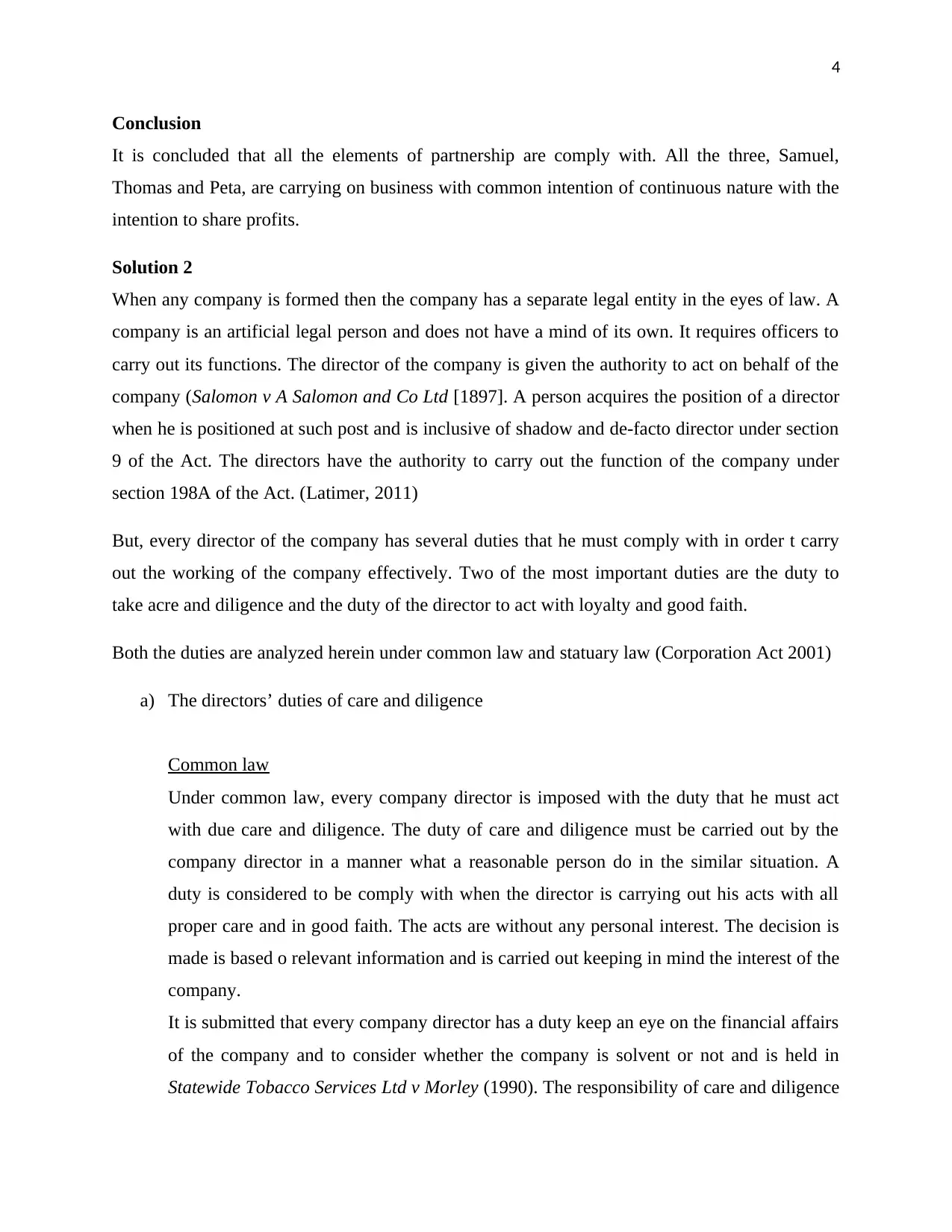
4
Conclusion
It is concluded that all the elements of partnership are comply with. All the three, Samuel,
Thomas and Peta, are carrying on business with common intention of continuous nature with the
intention to share profits.
Solution 2
When any company is formed then the company has a separate legal entity in the eyes of law. A
company is an artificial legal person and does not have a mind of its own. It requires officers to
carry out its functions. The director of the company is given the authority to act on behalf of the
company (Salomon v A Salomon and Co Ltd [1897]. A person acquires the position of a director
when he is positioned at such post and is inclusive of shadow and de-facto director under section
9 of the Act. The directors have the authority to carry out the function of the company under
section 198A of the Act. (Latimer, 2011)
But, every director of the company has several duties that he must comply with in order t carry
out the working of the company effectively. Two of the most important duties are the duty to
take acre and diligence and the duty of the director to act with loyalty and good faith.
Both the duties are analyzed herein under common law and statuary law (Corporation Act 2001)
a) The directors’ duties of care and diligence
Common law
Under common law, every company director is imposed with the duty that he must act
with due care and diligence. The duty of care and diligence must be carried out by the
company director in a manner what a reasonable person do in the similar situation. A
duty is considered to be comply with when the director is carrying out his acts with all
proper care and in good faith. The acts are without any personal interest. The decision is
made is based o relevant information and is carried out keeping in mind the interest of the
company.
It is submitted that every company director has a duty keep an eye on the financial affairs
of the company and to consider whether the company is solvent or not and is held in
Statewide Tobacco Services Ltd v Morley (1990). The responsibility of care and diligence
Conclusion
It is concluded that all the elements of partnership are comply with. All the three, Samuel,
Thomas and Peta, are carrying on business with common intention of continuous nature with the
intention to share profits.
Solution 2
When any company is formed then the company has a separate legal entity in the eyes of law. A
company is an artificial legal person and does not have a mind of its own. It requires officers to
carry out its functions. The director of the company is given the authority to act on behalf of the
company (Salomon v A Salomon and Co Ltd [1897]. A person acquires the position of a director
when he is positioned at such post and is inclusive of shadow and de-facto director under section
9 of the Act. The directors have the authority to carry out the function of the company under
section 198A of the Act. (Latimer, 2011)
But, every director of the company has several duties that he must comply with in order t carry
out the working of the company effectively. Two of the most important duties are the duty to
take acre and diligence and the duty of the director to act with loyalty and good faith.
Both the duties are analyzed herein under common law and statuary law (Corporation Act 2001)
a) The directors’ duties of care and diligence
Common law
Under common law, every company director is imposed with the duty that he must act
with due care and diligence. The duty of care and diligence must be carried out by the
company director in a manner what a reasonable person do in the similar situation. A
duty is considered to be comply with when the director is carrying out his acts with all
proper care and in good faith. The acts are without any personal interest. The decision is
made is based o relevant information and is carried out keeping in mind the interest of the
company.
It is submitted that every company director has a duty keep an eye on the financial affairs
of the company and to consider whether the company is solvent or not and is held in
Statewide Tobacco Services Ltd v Morley (1990). The responsibility of care and diligence
Paraphrase This Document
Need a fresh take? Get an instant paraphrase of this document with our AI Paraphraser
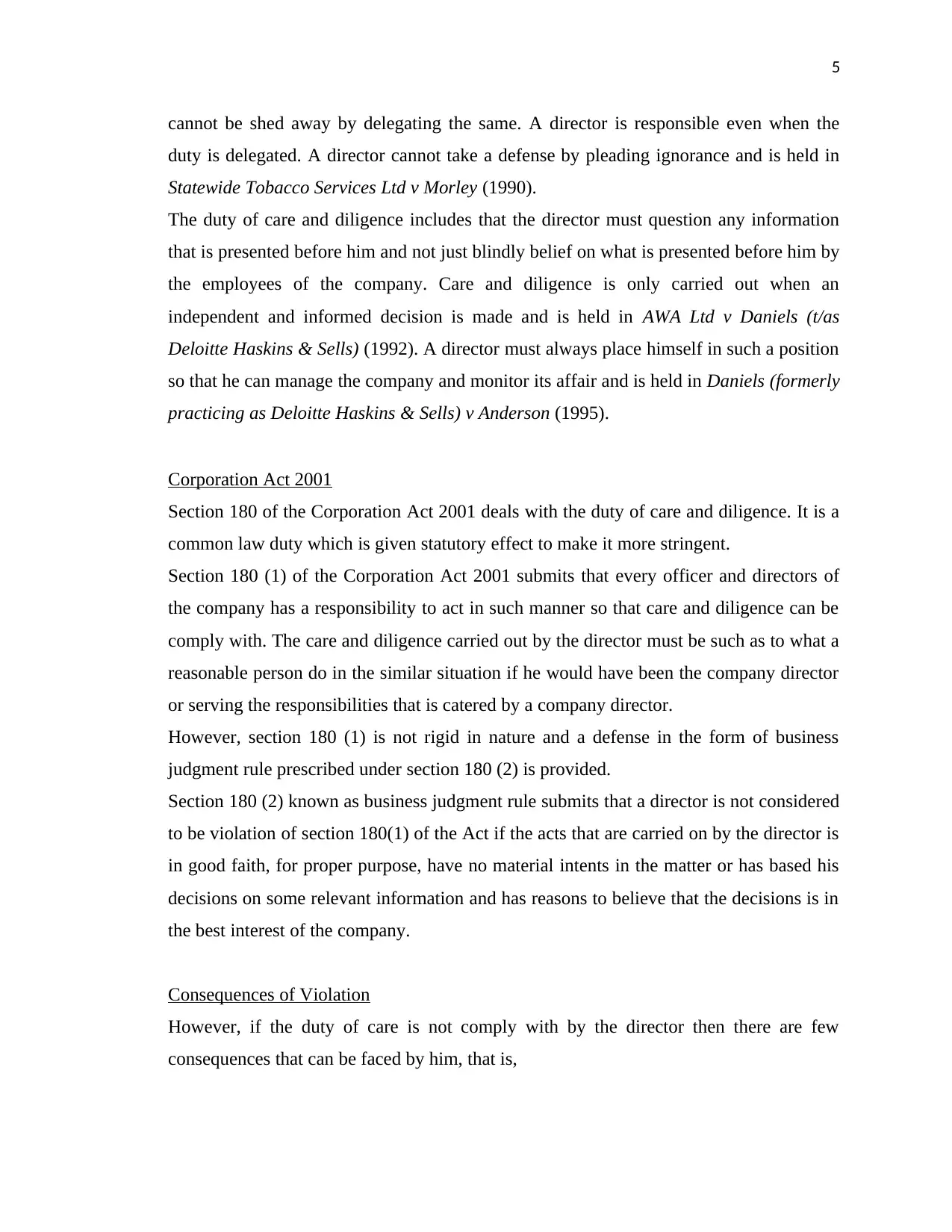
5
cannot be shed away by delegating the same. A director is responsible even when the
duty is delegated. A director cannot take a defense by pleading ignorance and is held in
Statewide Tobacco Services Ltd v Morley (1990).
The duty of care and diligence includes that the director must question any information
that is presented before him and not just blindly belief on what is presented before him by
the employees of the company. Care and diligence is only carried out when an
independent and informed decision is made and is held in AWA Ltd v Daniels (t/as
Deloitte Haskins & Sells) (1992). A director must always place himself in such a position
so that he can manage the company and monitor its affair and is held in Daniels (formerly
practicing as Deloitte Haskins & Sells) v Anderson (1995).
Corporation Act 2001
Section 180 of the Corporation Act 2001 deals with the duty of care and diligence. It is a
common law duty which is given statutory effect to make it more stringent.
Section 180 (1) of the Corporation Act 2001 submits that every officer and directors of
the company has a responsibility to act in such manner so that care and diligence can be
comply with. The care and diligence carried out by the director must be such as to what a
reasonable person do in the similar situation if he would have been the company director
or serving the responsibilities that is catered by a company director.
However, section 180 (1) is not rigid in nature and a defense in the form of business
judgment rule prescribed under section 180 (2) is provided.
Section 180 (2) known as business judgment rule submits that a director is not considered
to be violation of section 180(1) of the Act if the acts that are carried on by the director is
in good faith, for proper purpose, have no material intents in the matter or has based his
decisions on some relevant information and has reasons to believe that the decisions is in
the best interest of the company.
Consequences of Violation
However, if the duty of care is not comply with by the director then there are few
consequences that can be faced by him, that is,
cannot be shed away by delegating the same. A director is responsible even when the
duty is delegated. A director cannot take a defense by pleading ignorance and is held in
Statewide Tobacco Services Ltd v Morley (1990).
The duty of care and diligence includes that the director must question any information
that is presented before him and not just blindly belief on what is presented before him by
the employees of the company. Care and diligence is only carried out when an
independent and informed decision is made and is held in AWA Ltd v Daniels (t/as
Deloitte Haskins & Sells) (1992). A director must always place himself in such a position
so that he can manage the company and monitor its affair and is held in Daniels (formerly
practicing as Deloitte Haskins & Sells) v Anderson (1995).
Corporation Act 2001
Section 180 of the Corporation Act 2001 deals with the duty of care and diligence. It is a
common law duty which is given statutory effect to make it more stringent.
Section 180 (1) of the Corporation Act 2001 submits that every officer and directors of
the company has a responsibility to act in such manner so that care and diligence can be
comply with. The care and diligence carried out by the director must be such as to what a
reasonable person do in the similar situation if he would have been the company director
or serving the responsibilities that is catered by a company director.
However, section 180 (1) is not rigid in nature and a defense in the form of business
judgment rule prescribed under section 180 (2) is provided.
Section 180 (2) known as business judgment rule submits that a director is not considered
to be violation of section 180(1) of the Act if the acts that are carried on by the director is
in good faith, for proper purpose, have no material intents in the matter or has based his
decisions on some relevant information and has reasons to believe that the decisions is in
the best interest of the company.
Consequences of Violation
However, if the duty of care is not comply with by the director then there are few
consequences that can be faced by him, that is,
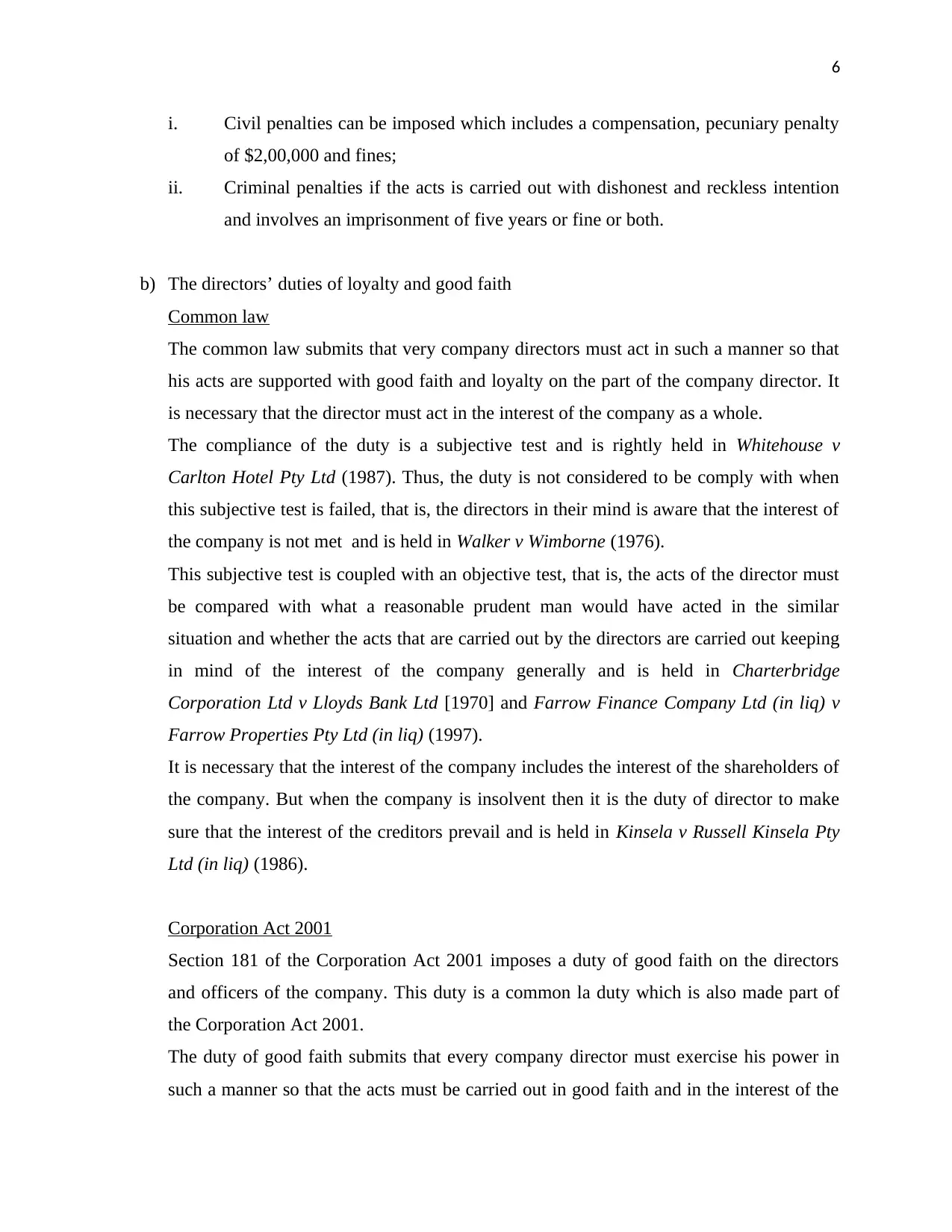
6
i. Civil penalties can be imposed which includes a compensation, pecuniary penalty
of $2,00,000 and fines;
ii. Criminal penalties if the acts is carried out with dishonest and reckless intention
and involves an imprisonment of five years or fine or both.
b) The directors’ duties of loyalty and good faith
Common law
The common law submits that very company directors must act in such a manner so that
his acts are supported with good faith and loyalty on the part of the company director. It
is necessary that the director must act in the interest of the company as a whole.
The compliance of the duty is a subjective test and is rightly held in Whitehouse v
Carlton Hotel Pty Ltd (1987). Thus, the duty is not considered to be comply with when
this subjective test is failed, that is, the directors in their mind is aware that the interest of
the company is not met and is held in Walker v Wimborne (1976).
This subjective test is coupled with an objective test, that is, the acts of the director must
be compared with what a reasonable prudent man would have acted in the similar
situation and whether the acts that are carried out by the directors are carried out keeping
in mind of the interest of the company generally and is held in Charterbridge
Corporation Ltd v Lloyds Bank Ltd [1970] and Farrow Finance Company Ltd (in liq) v
Farrow Properties Pty Ltd (in liq) (1997).
It is necessary that the interest of the company includes the interest of the shareholders of
the company. But when the company is insolvent then it is the duty of director to make
sure that the interest of the creditors prevail and is held in Kinsela v Russell Kinsela Pty
Ltd (in liq) (1986).
Corporation Act 2001
Section 181 of the Corporation Act 2001 imposes a duty of good faith on the directors
and officers of the company. This duty is a common la duty which is also made part of
the Corporation Act 2001.
The duty of good faith submits that every company director must exercise his power in
such a manner so that the acts must be carried out in good faith and in the interest of the
i. Civil penalties can be imposed which includes a compensation, pecuniary penalty
of $2,00,000 and fines;
ii. Criminal penalties if the acts is carried out with dishonest and reckless intention
and involves an imprisonment of five years or fine or both.
b) The directors’ duties of loyalty and good faith
Common law
The common law submits that very company directors must act in such a manner so that
his acts are supported with good faith and loyalty on the part of the company director. It
is necessary that the director must act in the interest of the company as a whole.
The compliance of the duty is a subjective test and is rightly held in Whitehouse v
Carlton Hotel Pty Ltd (1987). Thus, the duty is not considered to be comply with when
this subjective test is failed, that is, the directors in their mind is aware that the interest of
the company is not met and is held in Walker v Wimborne (1976).
This subjective test is coupled with an objective test, that is, the acts of the director must
be compared with what a reasonable prudent man would have acted in the similar
situation and whether the acts that are carried out by the directors are carried out keeping
in mind of the interest of the company generally and is held in Charterbridge
Corporation Ltd v Lloyds Bank Ltd [1970] and Farrow Finance Company Ltd (in liq) v
Farrow Properties Pty Ltd (in liq) (1997).
It is necessary that the interest of the company includes the interest of the shareholders of
the company. But when the company is insolvent then it is the duty of director to make
sure that the interest of the creditors prevail and is held in Kinsela v Russell Kinsela Pty
Ltd (in liq) (1986).
Corporation Act 2001
Section 181 of the Corporation Act 2001 imposes a duty of good faith on the directors
and officers of the company. This duty is a common la duty which is also made part of
the Corporation Act 2001.
The duty of good faith submits that every company director must exercise his power in
such a manner so that the acts must be carried out in good faith and in the interest of the
⊘ This is a preview!⊘
Do you want full access?
Subscribe today to unlock all pages.

Trusted by 1+ million students worldwide
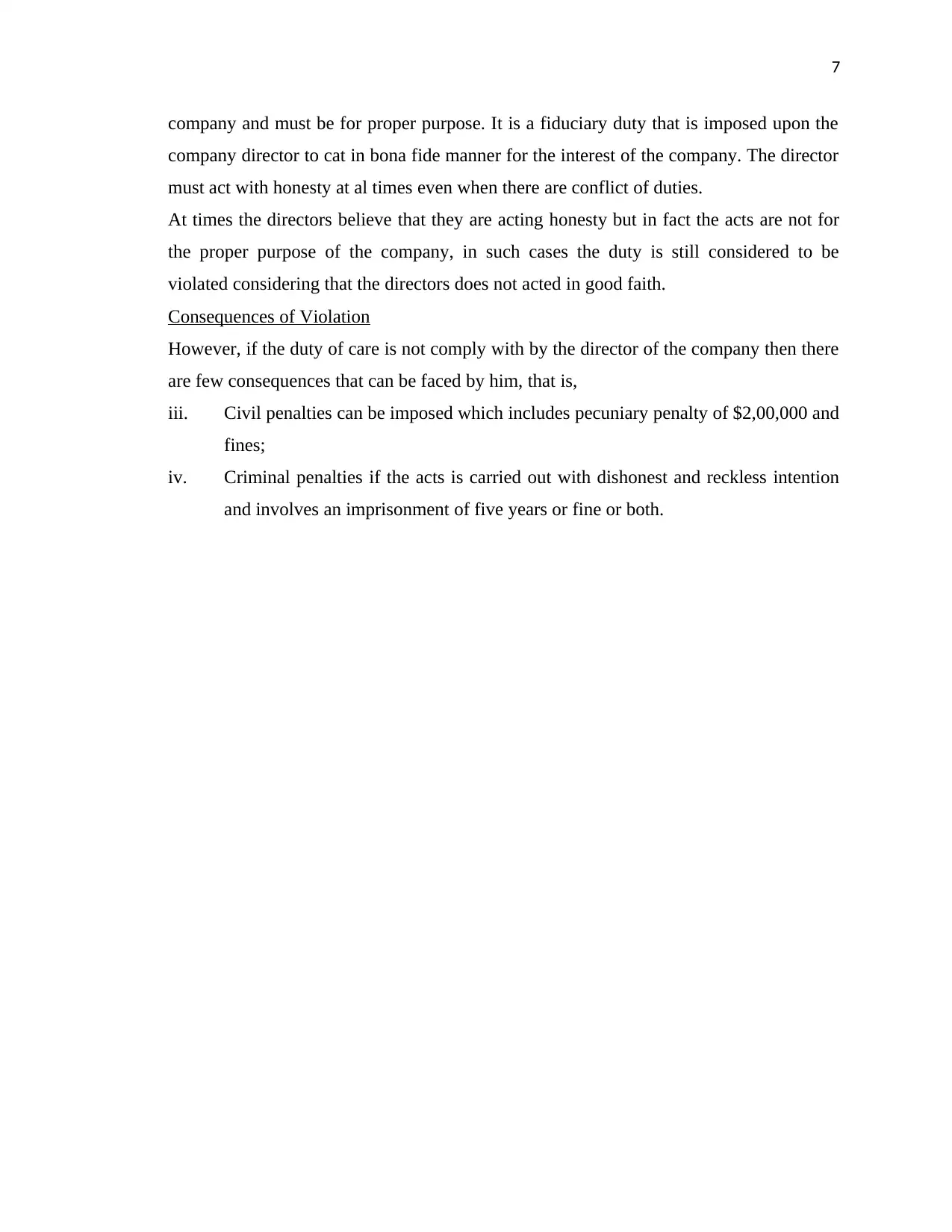
7
company and must be for proper purpose. It is a fiduciary duty that is imposed upon the
company director to cat in bona fide manner for the interest of the company. The director
must act with honesty at al times even when there are conflict of duties.
At times the directors believe that they are acting honesty but in fact the acts are not for
the proper purpose of the company, in such cases the duty is still considered to be
violated considering that the directors does not acted in good faith.
Consequences of Violation
However, if the duty of care is not comply with by the director of the company then there
are few consequences that can be faced by him, that is,
iii. Civil penalties can be imposed which includes pecuniary penalty of $2,00,000 and
fines;
iv. Criminal penalties if the acts is carried out with dishonest and reckless intention
and involves an imprisonment of five years or fine or both.
company and must be for proper purpose. It is a fiduciary duty that is imposed upon the
company director to cat in bona fide manner for the interest of the company. The director
must act with honesty at al times even when there are conflict of duties.
At times the directors believe that they are acting honesty but in fact the acts are not for
the proper purpose of the company, in such cases the duty is still considered to be
violated considering that the directors does not acted in good faith.
Consequences of Violation
However, if the duty of care is not comply with by the director of the company then there
are few consequences that can be faced by him, that is,
iii. Civil penalties can be imposed which includes pecuniary penalty of $2,00,000 and
fines;
iv. Criminal penalties if the acts is carried out with dishonest and reckless intention
and involves an imprisonment of five years or fine or both.
Paraphrase This Document
Need a fresh take? Get an instant paraphrase of this document with our AI Paraphraser
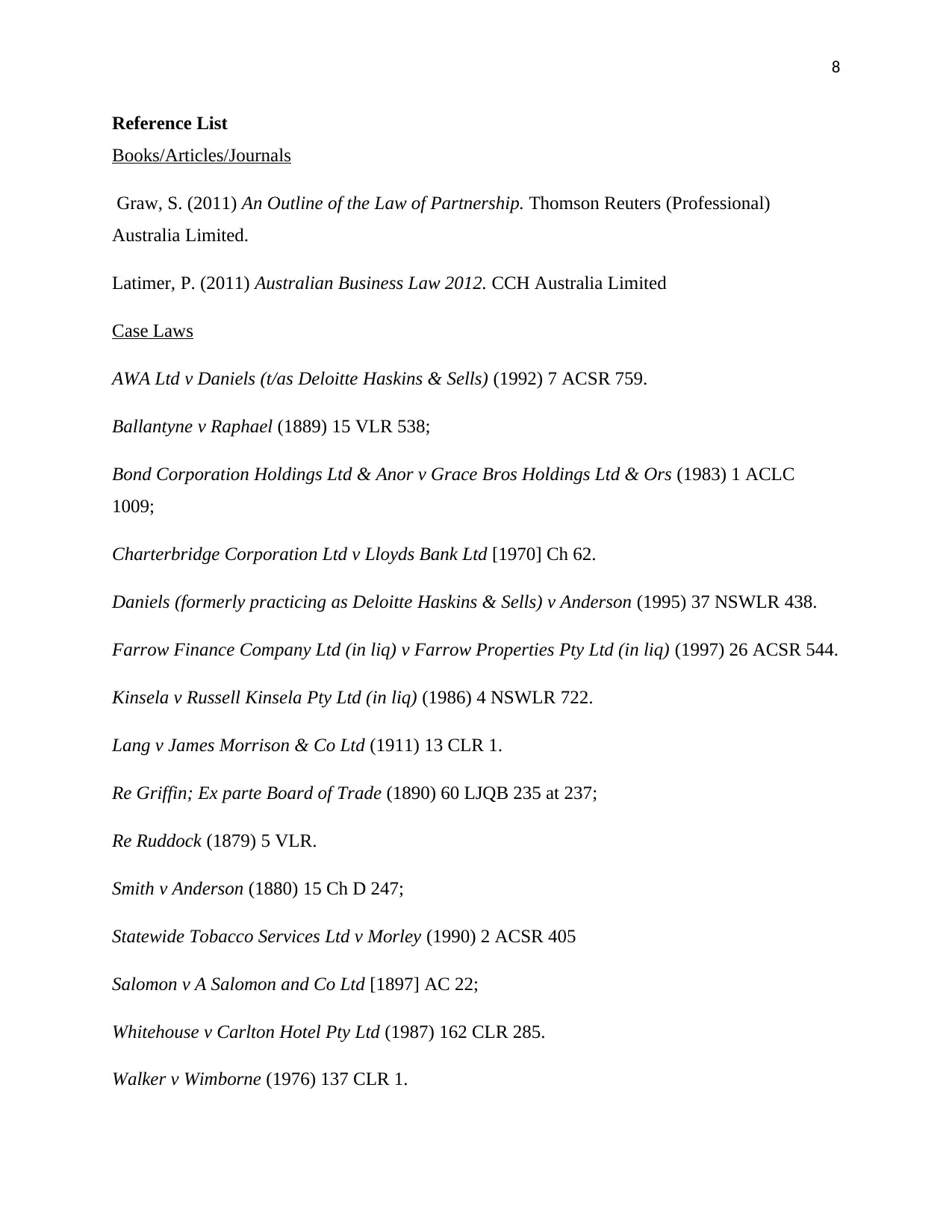
8
Reference List
Books/Articles/Journals
Graw, S. (2011) An Outline of the Law of Partnership. Thomson Reuters (Professional)
Australia Limited.
Latimer, P. (2011) Australian Business Law 2012. CCH Australia Limited
Case Laws
AWA Ltd v Daniels (t/as Deloitte Haskins & Sells) (1992) 7 ACSR 759.
Ballantyne v Raphael (1889) 15 VLR 538;
Bond Corporation Holdings Ltd & Anor v Grace Bros Holdings Ltd & Ors (1983) 1 ACLC
1009;
Charterbridge Corporation Ltd v Lloyds Bank Ltd [1970] Ch 62.
Daniels (formerly practicing as Deloitte Haskins & Sells) v Anderson (1995) 37 NSWLR 438.
Farrow Finance Company Ltd (in liq) v Farrow Properties Pty Ltd (in liq) (1997) 26 ACSR 544.
Kinsela v Russell Kinsela Pty Ltd (in liq) (1986) 4 NSWLR 722.
Lang v James Morrison & Co Ltd (1911) 13 CLR 1.
Re Griffin; Ex parte Board of Trade (1890) 60 LJQB 235 at 237;
Re Ruddock (1879) 5 VLR.
Smith v Anderson (1880) 15 Ch D 247;
Statewide Tobacco Services Ltd v Morley (1990) 2 ACSR 405
Salomon v A Salomon and Co Ltd [1897] AC 22;
Whitehouse v Carlton Hotel Pty Ltd (1987) 162 CLR 285.
Walker v Wimborne (1976) 137 CLR 1.
Reference List
Books/Articles/Journals
Graw, S. (2011) An Outline of the Law of Partnership. Thomson Reuters (Professional)
Australia Limited.
Latimer, P. (2011) Australian Business Law 2012. CCH Australia Limited
Case Laws
AWA Ltd v Daniels (t/as Deloitte Haskins & Sells) (1992) 7 ACSR 759.
Ballantyne v Raphael (1889) 15 VLR 538;
Bond Corporation Holdings Ltd & Anor v Grace Bros Holdings Ltd & Ors (1983) 1 ACLC
1009;
Charterbridge Corporation Ltd v Lloyds Bank Ltd [1970] Ch 62.
Daniels (formerly practicing as Deloitte Haskins & Sells) v Anderson (1995) 37 NSWLR 438.
Farrow Finance Company Ltd (in liq) v Farrow Properties Pty Ltd (in liq) (1997) 26 ACSR 544.
Kinsela v Russell Kinsela Pty Ltd (in liq) (1986) 4 NSWLR 722.
Lang v James Morrison & Co Ltd (1911) 13 CLR 1.
Re Griffin; Ex parte Board of Trade (1890) 60 LJQB 235 at 237;
Re Ruddock (1879) 5 VLR.
Smith v Anderson (1880) 15 Ch D 247;
Statewide Tobacco Services Ltd v Morley (1990) 2 ACSR 405
Salomon v A Salomon and Co Ltd [1897] AC 22;
Whitehouse v Carlton Hotel Pty Ltd (1987) 162 CLR 285.
Walker v Wimborne (1976) 137 CLR 1.

9
⊘ This is a preview!⊘
Do you want full access?
Subscribe today to unlock all pages.

Trusted by 1+ million students worldwide
1 out of 9
Related Documents
Your All-in-One AI-Powered Toolkit for Academic Success.
+13062052269
info@desklib.com
Available 24*7 on WhatsApp / Email
![[object Object]](/_next/static/media/star-bottom.7253800d.svg)
Unlock your academic potential
Copyright © 2020–2026 A2Z Services. All Rights Reserved. Developed and managed by ZUCOL.





